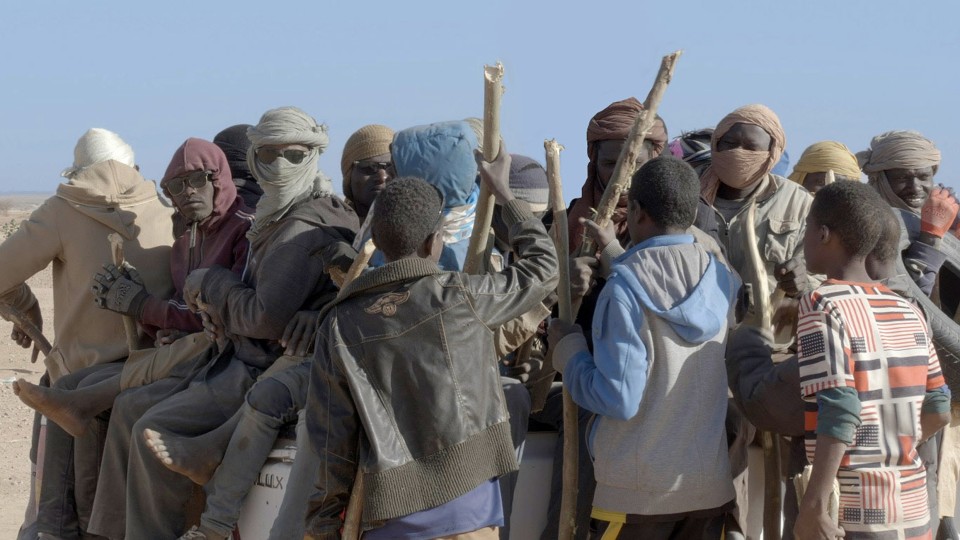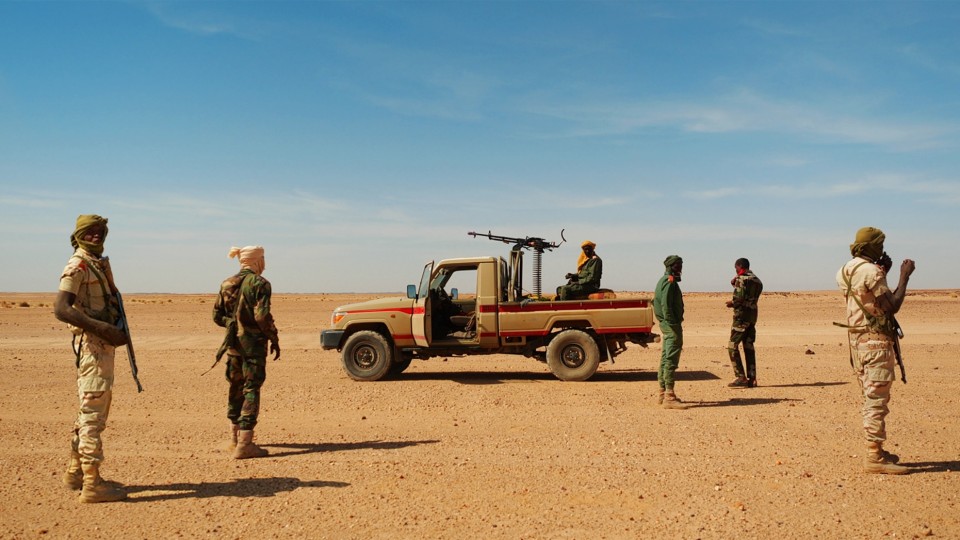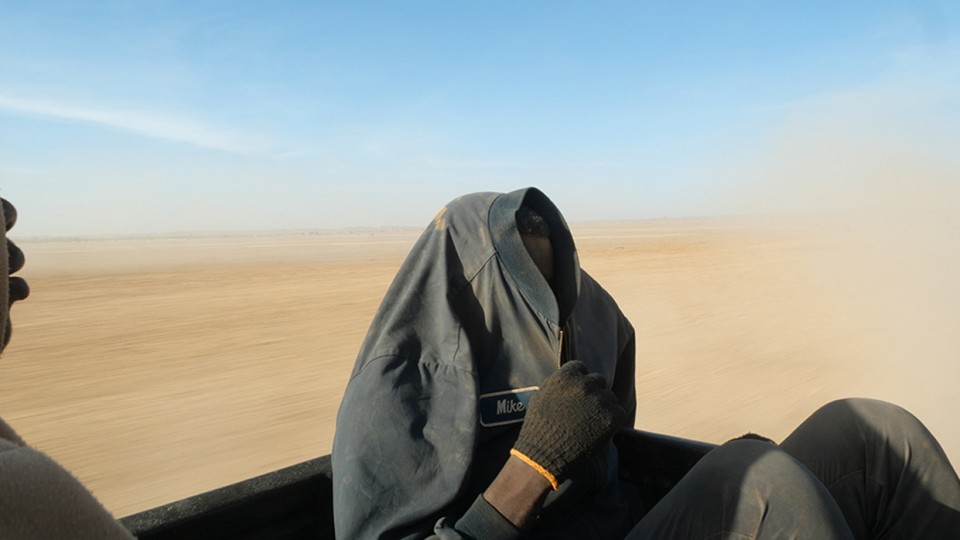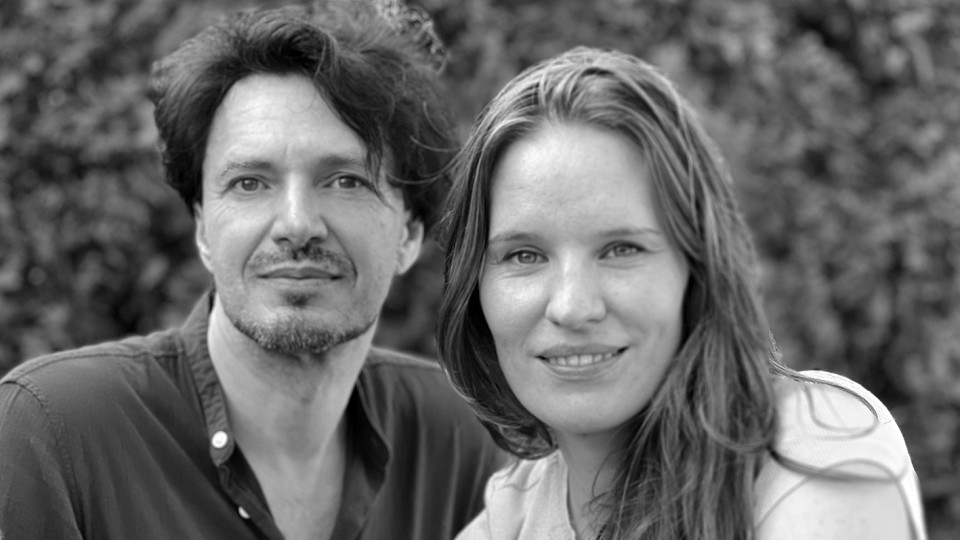The city of Agadez in northern Niger has a complex history; the upheaval it has experienced in recent years is simply dramatic.
While tourism declined long ago as a source of income, the city of the Tuareg then flourished as a hub of sub-Saharan migration
– until a virtual border established in the Sahara at the behest of the EU cut off the city's main source of income. Igor
Hauzenberger and Gabriela Schild, the directors of ON THE BORDER have paid repeated visits to Agadez, accompanying committed
Tuareg and watching as a city which had always maintained links to its nomadic tradition became, within a relatively short
period and for the most contradictory motives, a plaything of geopolitical interests.
ON THE BORDER takes us to an invisible border in Niger. Can you briefly describe the political circumstances that led to the
establishment of this border?
IGOR HAUZENBERGER: This border, or 'red line' as it was called by the Minister of the Interior and later President of Niger, Mohamed Bazoum,
is north of the city of Agadez. There were times when an estimated 85% of all migrants from sub-Saharan Africa passed through
Agadez on their way to the Maghreb or Europe. The local population, especially the Tuareg, would transport these people on
their life-threatening journey through the Sahara. This business activity, the "economy of migration" as it is called there,
was an extremely lucrative source of income, and for many years it ensured the prosperity of the city and the whole region.
No one regarded this service as illegal, especially since Niger is part of the ECOWAS Economic Community, which adheres to
the principle of free movement of persons. However, in 2015/2016 – at the insistence of the EU – a law was passed which made
it illegal to transport migrants who didn’t have a work visa and ID. Consequently, many of the migrants at the virtual border
suddenly had illegal status, and the transporters became smugglers. Overnight, without any advance warning, thousands of people
in Agadez lost their livelihoods.
GABRIELA SCHILD: It was hard for the people to understand the law. Agadez had been a hub of trans-Saharan trade for centuries. Many people
felt it simply didn’t make sense that they were now supposed to become, in effect, the gatekeepers of an African Schengen
border. Rhissa Feltou, a former mayor of Agadez and the central protagonist of ON THE BORDER, suggests that the region has
become a "European migration laboratory". And like many others, he is afraid that this law will create a "human timebomb",
because young people forced to become idle are easily susceptible to crime and radicalization. African offshoots of Islamic
State and Al-Qaeda are gaining more and more influence in the region and neighboring states. A zone of violence which is difficult
to control has emerged throughout the area.
How was it possible for you to shoot in this complex and explosive situation?
IGOR HAUZENBERGER: My initial involvement was primarily with rescue missions, where young men stranded in the desert were picked up by the UN.
When I met Rhissa Feltou and told him about my idea to make a film as part of a project over several years, he was very keen.
Then I tried to find someone in Austria who spoke fluent French and was familiar with Sufism, and that's how Gabriela came
on board.
GABRIELA SCHILD: I joined the project in 2019. The first time I arrived in the capital, Niamey, Islamic terrorists had just blown up a military
base. Agadez struck me as an island of peace in the midst of this increasing violence. In the Agadez region, a very tolerant
form of Islam is practiced, which is strongly influenced by Sufi undercurrents.
How did you deal with the issue of making a film about an African country as a white team?
GABRIELA SCHILD: ON THE BORDER is about various links and entanglements between Europe and West Africa. After 2020, filming permits for journalists
were only issued for a short time, and they became increasingly expensive. This was one reason I contacted the Nigerien Film
Institute, though we were also looking for Nigerien crew members so we could shoot in the local languages and not just in
French, the colonial language. It became a turning point in the whole project, because it was there that we met the filmmaker
Amina Weira, who comes from Agadez and was to be a very important member of the team.
IGOR HAUZENBERGER: And each year we became more and more of a multicultural team. The biggest compliment was paid to us by the chairman of the
Agadez regional council, when he remarked at a reunion in 2023: "You have visited us so many times, now you belong to us."
The film features many images and details of the city of Agadez. What was it that fascinated you about the city and its architecture?
IGOR HAUZENBERGER: The fascinating thing about Agadez is that it is a city made of clay which begins to glow red-orange at dusk. It also has
a transitory air to it, because the increasingly frequent downpours in summer are quite challenging for the architecture.
The buildings constantly have to be replastered, so they don’t disappear in this merciless climate. Nomadism is likely to
disappear in the next generation, but it lives on in this Sufi city with its proud inhabitants and ecstatic celebrations.
How did Rhissa Feltou become the protagonist of ON THE BORDER?
GABRIELA SCHILD: Igor met Rhissa in 2018, when he was still mayor. When Rhissa was removed from office in 2019, he suddenly had a lot of time
for us. He saw our film as an opportunity to draw attention to the fate of his people and tell the story of his city in all
this geopolitical upheaval.
Does the radio journalist Tilla Amadou also represent a culture that accords women an important role?
IGOR HAUZENBERGER: I still remember my first impressions of encountering women without veils, while only the eyes of the men could be seen behind
the Tagelmust scarf. In the Tuareg culture, matriarchal structures exist by law. Among the nomads, when a man and woman get
married, he moves into her tent – and if he leaves her, he loses everything.
GABRIELA SCHILD: Tilla is a self-confident Targi whose voice is familiar to everyone from the radio. She is a role model for many women and
young girls. Her breakthrough came when Deutsche Welle discovered her and began using her for gripping reports. That’s how
she became known far beyond the country's borders as an ambassador of her culture. In her work, she is courageous in addressing
social issues and giving people – especially women – space to express their opinions. Unfortunately, free journalism has only
been possible since the coup to a limited extent.
You also film the police training program EUCAP, initiated by the EU. Are you trying to suggest here that the EU strategy
doesn’t match the reality of the situation?
IGOR HAUZENBERGER: The civilian EUCAP mission was trying to usher in a new era. The specific plan was to train police officers, hand over vehicles
and equipment and then leave the country when the mandate came to an end in 2024. There was a concrete exit schedule. According
to Angela Merkel, Europe's approach was to create cooperation on an equal footing. But after her departure, there was a complete
lack of leadership. Despite many committed institutions and aid projects, Europe has never performed a supervising function
and coordinated individual areas of responsibility within a development concept in this much-cited "Niger anchor of stability".
The Agadez region could have become a lighthouse project linking migration with a business location. But instead of relocating
businesses and creating new jobs, unemployment was allowed to remain high, which continued to drive young people into the
arms of gangs and terrorists. After the military coup, a security policy vacuum arose because there was no master plan. Now
the entire Sahel and the Sahara are under the influence of Russia, China and Turkey. It is extremely doubtful whether it will
be possible to keep the peace in this region of 600 million people.
What form of help from outside could be useful?
GABRIELA SCHILD: Difficult question. "Help" from the West is no longer wanted: EUCAP has been expelled from the country, as have the French
and German military forces. The Americans have also closed their drone bases in Agadez and Niamey now, because the Russian
Africa Corps is building facilities there. Social media has started to instill a pan-African sentiment in the younger generation, in contrast
to the older generation, which always came to terms with inequalities. The military has picked up on this mood in the population
and deposed the pro-European President Mohamed Bazoum. The young generation is asking the right question: "Why are we one
of the poorest countries in the world, even though we are so rich in natural resources?"
IGOR HAUZENBERGER: A historic paradigm shift is taking place in West Africa. Europe is largely retreating – but instead of pan-African emancipation
replacing it, a new dependence is quickly being established. Putin now has great influence, extending from Central Africa
to Mali. The military regime in Niger boasts of having kicked Europe out but overlooks the fact that parts of the infrastructure
quickly collapsed, leaving the population impoverished; now violence is increasing. It’s extremely ironic that one of the
most beautiful and remote regions in the world is only attracting public attention because of migration and, more recently,
of a burgeoning proxy war. You could say that a microcosm of world conflicts is developing there, similar to the situation
in the Balkans around 1900.
The first shot presents a recurring image: countless plastic remnants fluttering in the trees, reminiscent of crows in the
branches. A gloomy symbol?
IGOR HAUZENBERGER: It is remnants of Western-influenced capitalism that have become entangled in the desert city. The plastic sticks to the
trees until they die. We show Rhissa in his garden as he painstakingly removes the plastic. We put this scene at the beginning
of the film because it is representative of the fight against seemingly overpowering forces. As a Tuareg, the protection of
the environment means a lot to him. If the ecosystem changes, it’s not just the animals that die: so do the people. The plastic
is a symptom of this. In the shooting concept, we described him as a Sisyphus figure who continues to fight tirelessly. But
you notice that at some point it becomes too much for him as well, and his strength fades. Rhissa lives with a packed suitcase
in his bedroom. It is an ontological remnant in his nomadic personality. So he can run away at any time, but also come back
when the situation has calmed down and the peacemakers are required again.
Interview: Karin Schiefer
October 2024
Translation: Charles Osborne






